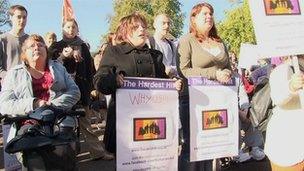
Ellen Richardson
How does the United States respond to women who living with depression or women living with cancer? Exclusion. Solitary confinement. Women pay a high price for `security’. For women who have ever asked for help, the cost exacted from their bodies is astronomical and lethal. When so-called security trumps absolutely everything, absolutely anything can be done in the name of `protection.’ Ask Carol Lester. Ask Ellen Richardson.
Carol Lester is 73 years old, a grandmother, and a guest of the State, at the New Mexico Women’s Correctional Facility. Lester suffers from thyroid cancer, bipolar depression, and now, thanks to the State, possibly PTSD. Here’s part of her story.
Carol Lester complained about stomach pains. Prison staff gave her Zantac. Shortly after, she tested positive for methamphetamine. Lester has no history of drug abuse of any kind, and Zantac is well known to result in false positives. No matter. Right after the `positive’ result, Carol Lester was sent to solitary, where she protested on many counts. To no avail. Carol Lester spent 34 days in the hole. The drug use charges have been rescinded. Carol Lester continues to suffer … and to protest. She is suing Corrections Corporation of America, CCA, who run the prison, and Corizon Inc, who run the prison `healthcare’ system, such as it is.
Ellen Richardson was on her way, from her home in Toronto, to New York. There she was to board a cruise ship headed for the Caribbean. Homeland Security had other ideas. Richardson was turned back at the border. Why? “Ellen Richardson says she was told by U.S. customs officials at Pearson International Airport on Monday that because she had been hospitalized for clinical depression in June 2012, she could not enter the U.S.”
Richardson has been very public about her earlier, and lifelong, struggle with depression. She has written about it, has given talks about it. It’s no secret. Quite the opposite. Ellen Richardson is a woman who asked for help, received help, and now that she is doing both better and well … must pay the price. Richardson has joined with other mental health activists to find out how Homeland Security had access to her medical records.
Carol Lester and Ellen Richardson are not anomalies nor are they exceptions. From the perspective of the State built on security – surveillance – imprisonment, putting a grandmother with cancer in solitary confinement is anything but crazy. From that perspective, it’s good business, good policy, a win-win for democracy. Turning away a paraplegic women because she asked for help is part of the rule of law, in this case the United States Immigration and Nationality Act, Section 212, which instructs border agents to protect the United States from anyone who has a physical or mental disorder that threatens “property, safety or welfare.”
Nothing here is accidental or incidental. Carol Lester and Ellen Richardson are both women living with disabilities. In this country, they are marked, one for the slow death of solitary confinement, the other for the virtual death of exclusion. What you can’t see can’t hurt you, right? The only surprise, for the State, is that the women aren’t taking it. They are organizing and mobilizing, and that, of course, is no surprise at all. The struggle continues.
(Photo Credit: Toronto Star / Bernard Weil)
